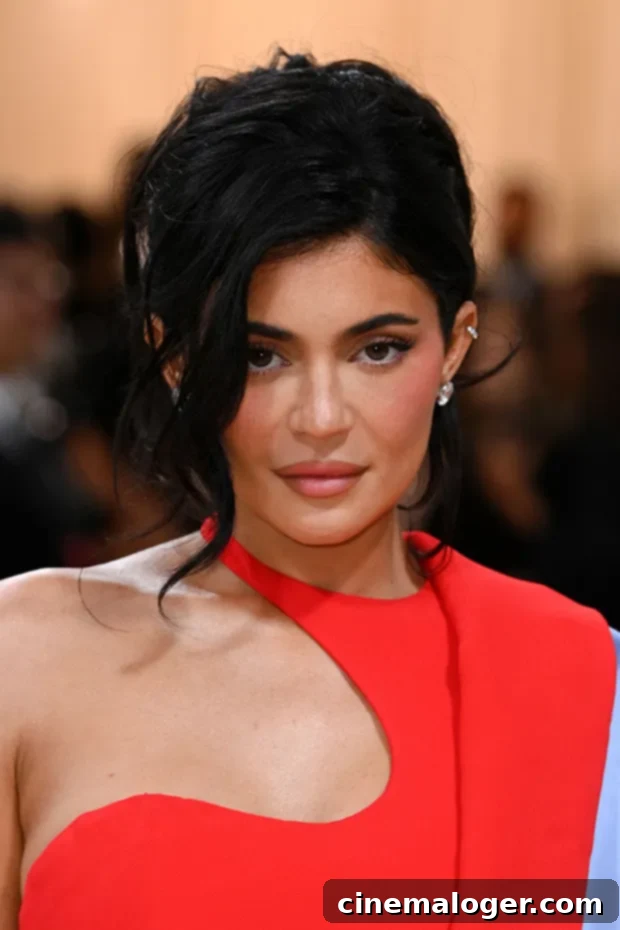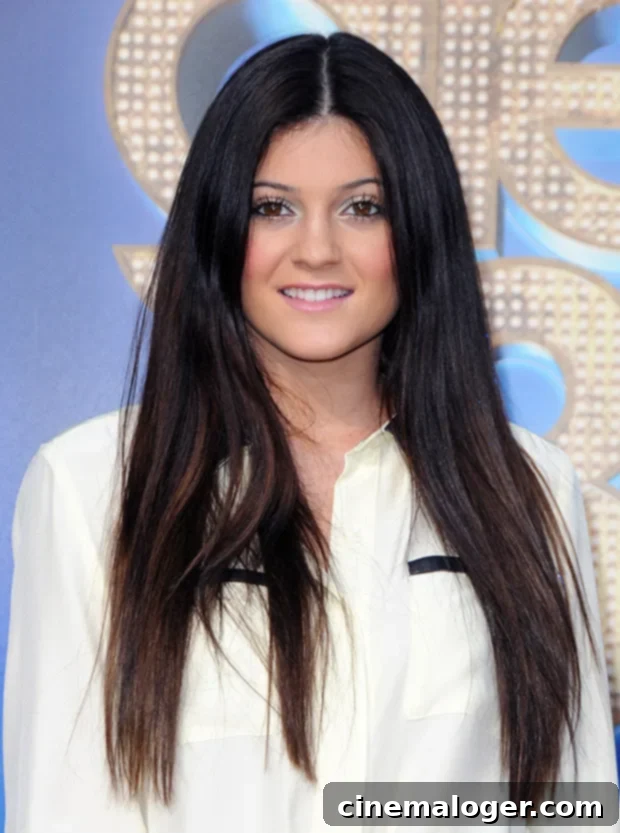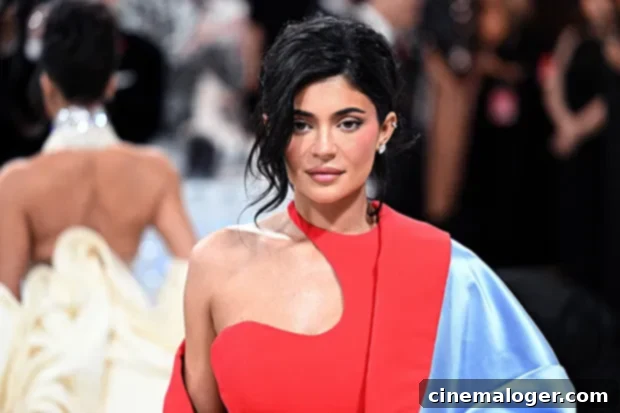Kylie Jenner, Khloe, and Kourtney Kardashian Unveil Raw Truths About Beauty Standards, Insecurities, and Social Media’s Grip on ‘The Kardashians’
In a deeply candid and remarkably powerful segment from the July 20 episode of The Kardashians, viewers were invited into an intimate conversation that transcended the usual reality TV drama. The episode featured Kylie Jenner, arguably one of the most influential figures in contemporary beauty culture, alongside her sisters Kourtney Kardashian and Khloe Kardashian. What began as a seemingly casual makeup session between Kylie and Kourtney quickly evolved into a profound discussion about the pervasive influence of the Internet on beauty standards and the unrealistic expectations it fosters. Kylie, reflecting on the immense platform she and her family command, articulated a poignant concern: “I just feel like we have huge influence and what are we doing with our power?” Her question underscored a shared burden of responsibility, especially as she observed countless young girls online engaging in extreme photo editing. She openly admitted to having navigated that very same phase herself, stating, “I went through that stage, too, and I feel like I’m in a better place, but other people can instill those insecurities in you.” This vulnerability from Kylie set the tone for a dialogue that explored the complex relationship between self-perception, societal pressure, and the digital age.
The conversation deepened as Khloe Kardashian offered her own powerful perspective, revealing a stark truth about the origins of her insecurities. She confessed that her own self-doubt was not inherent but rather a direct consequence of external scrutiny. “I was chubby and in a skintight bodycon dress and you couldn’t tell me otherwise,” she recalled, highlighting a period of self-acceptance that preceded public judgment. It was society’s incessant commentary and critical gaze, she asserted, that ultimately “gave me those insecurities.” Khloe’s journey into the public eye, particularly on television, exposed her to relentless comparisons with her sisters, Kim and Kourtney, who fit a more conventional beauty ideal at the time. “I’ve been torn apart from the minute I’ve gone on TV. I didn’t look like my sisters, so therefore, it’s not good enough,” she lamented. This constant barrage of criticism led her down a path of attempting to conform, seeking aesthetic changes in an effort to appease her detractors. She candidly shared, “Then I started changing my look — you get better makeup, you get fillers, I had a nose job — and there’s still people bullying you.” This revealed a frustrating paradox: despite her efforts to meet external standards, the criticism persisted, leaving her to question, “Which one is it? You didn’t like me then, you don’t like me now.” Khloe’s testimony painted a vivid picture of the relentless pressure faced by public figures, particularly women, to achieve an ever-shifting and often unattainable ideal of perfection, a standard that social media has only amplified exponentially.

In a subsequent confessional, Kylie Jenner took the opportunity to address long-standing public misconceptions about her own transformation and self-perception. She aimed to correct a narrative that has followed her for years, asserting that her journey with self-image was far more nuanced than popularly believed. “One of the biggest misconceptions about me is that I was this insecure child and I got so much surgery to change my whole face,” she clarified, dismissing the widespread belief that she underwent extensive cosmetic procedures. She firmly stated, “That’s false. I only got fillers.” This distinction is crucial for Kylie, as it reframes her story from one of extreme insecurity leading to drastic surgical alteration to one of more contained cosmetic enhancements. She articulated a strong desire to set the record straight, emphasizing, “I don’t want that to be part of my story. I always want everyone to just love themselves.” Her statement underscores the irony of her position: despite being at the forefront of the beauty industry and having made personal choices regarding her appearance, her core message remains one of self-acceptance and embracing one’s natural beauty. This segment served as an important clarification for fans and critics alike, offering a glimpse into Kylie’s genuine desire to promote a healthier self-image narrative, especially given her immense influence on younger generations who often look to her as a beauty icon. She recognized the weight of public perception and sought to ensure her personal truth resonated with her broader message of self-love and confidence, moving past sensationalized narratives that have often defined her public persona.
The sisters continued to delve into the genesis of their insecurities, exploring how even within their close-knit family, seemingly innocent comments could leave lasting marks. Khloe opened up further, making a startling admission that underscored the pervasive influence of family dynamics on self-perception. She revealed that she might never have even considered undergoing a nose job had her own mother, Kris Jenner, not made numerous comments about her nose over the years. This revelation highlighted how subtle, yet persistent, remarks from a parent can profoundly shape a child’s self-image and lead to profound body image issues. It demonstrated that even powerful, successful women like the Kardashians are not immune to the deep-seated impacts of familial observations on their self-esteem. The conversation then took another unexpected turn when Kylie shared an eye-opening personal insecurity with Khloe and Kourtney – an insecurity that, remarkably, her sisters were entirely unaware they had inadvertently instilled in her. This moment was particularly poignant, as it illustrated the often-unseen ripple effect of words and actions, revealing how perception can drastically differ between the speaker and the receiver. It set the stage for one of the most vulnerable and relatable moments of the entire discussion, showcasing the complexities of sibling relationships and the unintended consequences of casual remarks, even within a loving family context.

Kylie’s revelation about her ears struck a deep chord with her sisters and viewers alike, exposing how even seemingly trivial comments can foster profound self-consciousness. With raw honesty, she confessed, “You don’t realize how you guys always talked about my ears.” Khloe, visibly surprised, immediately insisted that her comments about Kylie’s ears were always rooted in affection, believing she only spoke about them because she “loved” them. However, Kylie’s experience was drastically different from her sister’s intention. She elaborated on how she internalized those remarks, explaining, “I received it like everyone was talking about my ears, [pulling on them] and calling me Dopey.” This candid admission underscored the vast difference between intent and impact, highlighting how a playful nickname or seemingly loving observation can morph into a source of deep insecurity for the recipient, especially a young, impressionable child growing up in the public eye. The psychological effect on Kylie was significant and long-lasting. She admitted, “I NEVER thought about my ears and then for, like, five years I never wore an updo.” This small, yet powerful, detail illustrated the extent to which this specific insecurity dictated her choices in styling and public appearance, a constant reminder of a perceived flaw that was amplified by external commentary. It served as a poignant example of how external validation and the language used by those closest to us can inadvertently shape our self-image, sometimes for years, without the awareness of those who initiated the remarks.
Kylie’s journey of overcoming her ear insecurity, ironically, found its catalyst in a moment of profound love and acceptance: the birth of her daughter, Stormi Webster. This personal milestone became a pivotal turning point in her relationship with her own body. “She had my ears and it made me realize how much I love them,” Kylie shared, a wave of emotion evident in her voice. Seeing her distinctive ears reflected in her child, whom she viewed as the epitome of beauty and perfection, completely transformed her perspective. This moment of pure, unconditional love allowed her to reframe her perceived flaw into a cherished trait. “I’m like, wow, I’m insecure about my ears, but I think my daughter is the most beautiful person ever,” she mused. This powerful realization helped her dismantle years of self-consciousness and embrace a part of herself she had previously hidden. The tangible proof of this transformation is visible in her public life: “Now I wear an updo every carpet.” This simple act of wearing her hair up on red carpets, once unthinkable for her, became a symbol of her newfound self-acceptance and confidence. It underscored the profound impact that motherhood can have on a woman’s body image and self-esteem, providing a fresh lens through which to appreciate and celebrate one’s unique features, especially when they are passed on to a beloved child. Her story offered a beacon of hope and a powerful message about finding self-love through the unconditional love for another.
As mothers themselves, Kylie, Kourtney, and Khloe collectively expressed a shared and fervent desire for their children to grow up in a world less fixated on superficial appearances. The conversation naturally extended to their parenting philosophies, acknowledging the intense scrutiny they faced and their determination to shield their own offspring from similar pressures. Kourtney, reflecting on her own upbringing, admitted, “I think my mom always had us dressing alike and being really polished with hair done.” This insight highlighted a generational approach to presentation that, while perhaps well-intentioned, could foster a focus on external perfection. In contrast, Kourtney articulated a conscious effort to forge a different path with her children: “I’m just really conscious with my own kids about giving them the freedom to express themselves and not put so much pressure on perfectionism.” This commitment to fostering individuality and self-expression, rather than adherence to strict beauty ideals, represented a significant shift. The sisters recognized the immense responsibility they carry as role models, not just for their own children but for millions of young people who follow their every move. Their discussion underscored a universal parental instinct: to protect their children from the pitfalls they themselves encountered, particularly in an age where social media amplifies beauty standards to an unprecedented degree. They emphasized the importance of instilling self-worth that is independent of physical appearance, striving to cultivate environments where their children can thrive authentically and confidently, free from the external judgments that so heavily impacted their own formative years and careers.
The segment of the episode culminated with some truly powerful words of wisdom from Kylie Jenner, encapsulating the essence of the entire conversation. She offered a refreshing perspective on resilience and grounding oneself amidst the chaos of public life. “You also have to realize that no matter what drama I’m going through on social media, I have such a beautiful personal life,” she shared, drawing a clear distinction between her public persona and her private reality. This statement served as a vital reminder that the curated online world, often fraught with negativity and superficiality, pales in comparison to the genuine connections and experiences that define one’s true happiness. Kylie eloquently articulated the foundations of her contentment: “I have the best kids, I have really amazing friends and family who know who I am.” Her emphasis on these core relationships highlighted the profound importance of a strong support system – individuals who see beyond the glamour and the headlines, understanding her true self. She underscored the value of this authentic connection, adding, “You have all these people close to you and understand exactly what you’re going through. I think that’s a beautiful thing.” Ultimately, Kylie distilled her philosophy into a profound statement about what truly matters, offering a universal lesson in prioritizing genuine fulfillment over fleeting fame: “If this all went away tomorrow, I know that I have real love to fall back on. That’s all that really matters to me.” This concluding thought provided a powerful message of self-worth derived from internal peace and authentic relationships, rather than external validation or adherence to impossible beauty standards. It was a testament to finding stability and purpose beyond the transient world of celebrity and social media, offering a valuable lesson in resilience and the enduring power of true human connection.
